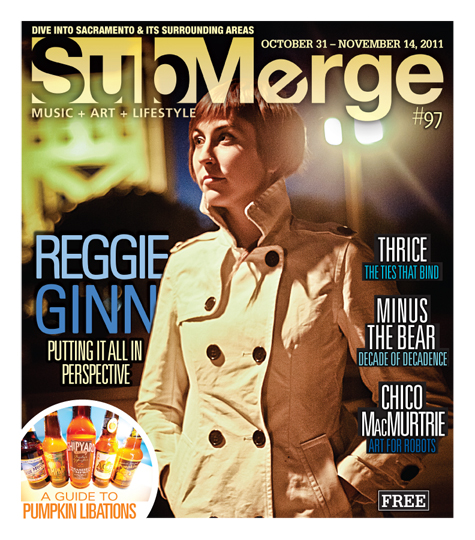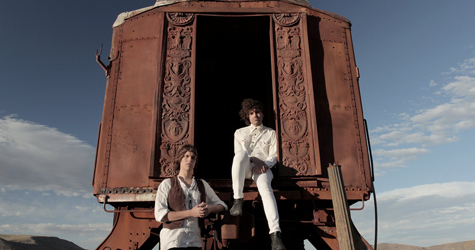Local singer-songwriter Sherman Baker recently released his second EP, Panic on Seventeenth, and will celebrate with a show at Luigi’s Fungarden on Friday, Dec. 2, 2011. Fans of Wilco, Violent Femmes and The Pixies are sure to dig Baker’s nasal-y, folk-meets-punk-rock vibe. With your $5 admission to the show, which starts at 8:30 p.m., you’ll get a free download card for Panic on Seventeenth. Accompanying Baker that night will be Joseph Kojima Gray on bass and Brian Guido on drums. Both are also in the band 50-Watt Heavy. Opening the show will be Brolly the Well and Damon & Mason (of the band Forever Goldrush). Baker worked on his new four-song EP with Robert Cheek (producer, engineer) and Matt McCord (played percussion on the recordings); both are longtime staples in the Sacramento music scene. The four songs on Panic… will show up in some form or another on a full-length album Baker plans to record in February 2012 called Seventeenth Street, which will also feature eight brand new songs. Baker plans to spend two weeks at The Hangar, again with Robert Cheek manning the boards. For more information and to keep in the loop with all things Sherman Baker, visit Shermanbakermusic.com
Tag Archives: Luigi’s Fungarden
SHERMAN BAKER RELEASES PANIC ON SEVENTEENTH
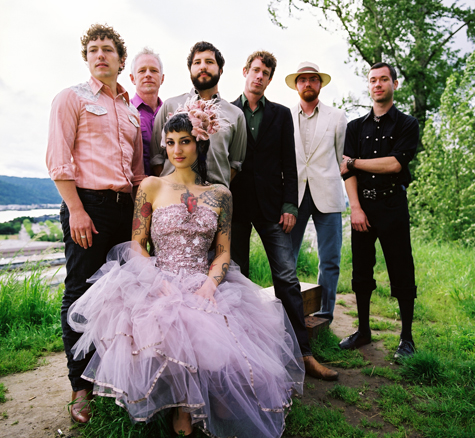
And Be Present, Y La Bamba
Y La Bamba’s Luz Elena Mendoza Moves Forward
All sound is building. That doesn’t mean music can’t be original, it just means influence is a given. It’s how you interpret that influence that makes something original. Take Y La Bamba, for instance. The sound–self-proclaimed gypsy-pop, press-reputed art folk–embodies a certain sacredness. The meld of dreamy percussion, staccato swells of accordion, guitar licks evoking traditional Mexican songs, all move as one, almost with a ritualistic sense. The most enchanting part is the voice of Luz Elena Mendoza; her loose webs of harmony and vocal flutterings tapping notes all over the register. She seems in a trance, like she’s merely a medium, channeling these noises. In some ways, it’s true: She’s a medium for her influences. Mendoza grew up spending summers in Northern California orchards with her family and a larger Mexican community. There were a lot of parties with many musicians, during which Mendoza would see her father perform freely.
“He would be the only one in the family to have that musical drive,” Mendoza said. “I saw him kind of be out of his body, and for me to be little and grow up and see that, I guess I was just trying to tap into that, naturally that kind of stuff just finds you.”
Those early summers were the basis of Mendoza’s musical foundation, of seeing “the passion, the rawness, the expression,” she said.
As an adult, Mendoza relocated to Portland, Ore., her current home base, along with her cat, Bamba, who unintentionally became the reason for her band’s name.
“I made up a moniker, Y La Bamba, me not being present, and the cat,” Mendoza said.
The band has now grown into a six-piece group, with Mendoza still writing the skeletons of each song, filled into full-body sounds by her band mates. The group is currently on a West Coast tour, recently having made their first stop in Seattle, where Mendoza takes a minute to answer all these questions and reflect on her Northwest home.
“Since I’ve been living in Portland, I’ve just been becoming my own, and definitely have my roots within my core,” Mendoza said. “Everything I do with music, I see the image of my father and my mother and my ancestors. But because I live up in Portland it’s been hard in the last few years of my adult life to be connected to my ethnicity, the traditions my family had.”
Despite the distance from her early roots, Mendoza’s been lucky to fall into the arms of the growing musical body of Portland, that beautiful Northwest hub of artists in a forest. Soon after she began playing music around the area, Mendoza was lucky enough to have her first album, Lupon, produced by The Decemberists’ guitarist Chris Funk, and released by the quickly budding Portland-based label, Tender Loving Empire.
That northwestern tip of Oregon is quickly becoming a strong presence on the country’s map of music, thanks to some talented heavyweights like Modest Mouse’s Isaac Brock, The Decemberists’ Colin Meloy, M. Ward and others.
“Portland’s really cool like that, there are so many musicians, a lot of people that have made a name for themselves outside of Portland,” Mendoza said.
However, it’s not just the bigger successes who give Portland its sonic reputation, it’s the community itself. Artists actually supporting other artists.
“Because Portland is such a music Mecca, it’s not hard to go out and play a song at a local pub and have people support you, and all of the sudden people supporting your vision, it just naturally happens,” Mendoza said.
Not to be misled, Portland may be becoming the land of milk and honey, but not in a lucrative sense, more in the way of ample human resources, most importantly, support.
“It’s not like we’re all making a whole shit-ton of money,” Mendoza said. “It’s not like something you seek out, it’s like dinner’s ready, just sit down and eat.”
After the success of Y La Bamba’s first record, Lupon, many things began to come to light about Mendoza’s past, one being an excruciating period of her life when she contracted amoebic dysentery and giardia while traveling at a young age. The illnesses took a gigantic toll on her overall health and resulted in substantial weight loss and depression. The repercussions of that experience are very much present in Lupon. However, despite their being at the lyrical forefront, they’re still tender wounds for Mendoza.
“I know you could sit there and talk about it like, ‘We need those things, they’re allies in later life,’ but for me they really stick in my spine,” Mendoza said.
When she first arrived in Portland, Mendoza was still very much suffering from her sicknesses, which bled into a lot of her interviews and musical demeanor.
“All of those things are part of my quilt,” Mendoza said. “Anything that creates a chip on my shoulder is going to be more prolific for me to explore.”
But now, Mendoza is ready to lay those things aside and grow from them. The newest Y La Bamba installation, Court and Spark, set to come out early next year, is produced this time by the recent Portland transplant, Steve Berlin, band member of Los Lobos.
This album devotes a larger chunk to her roots, with more tracks sung in Spanish.
“There’s way more songs in Spanish. It’s not like I was trying to go for that, it just kind of naturally happened,” Mendoza said.
Despite its subconscious appearance, keeping that presence in the Y La Bamba sound is something that’ll be protected.
“Writing in Spanish is something I don’t ever want to forget; I feel like I’m speaking from my ancestors,” Mendoza said.
Beyond her past, Mendoza is ready for forward action, to keep ties to her influences and what’s essentially made her present, and move on.
“For those who are totally hungry for growth, everyone has their own interpretation, but my intention when I wrote those songs was to simplify my mind, and if that’s healing to others, I just want the audience to know that’s there,” Mendoza said.
Y La Bamba will play Luigi’s Fungarden in Sacramento on Friday, Nov. 18, 2011. Also performing will be Death Songs and Armando Rivera. Show starts at 8:30. Look for Y La Bamba’s forthcoming new album early next year.

Sweet Release, Reggie Ginn
Reggie Ginn’s third album puts her passion in perspective
Back in high school, Reggie Ginn decided she wanted to learn how to play the piano. But unlike most students she tossed the Basics of Piano book behind her and ditched the formal instructor that would watch her every move. All she needed was a little help from Tori Amos.
“Since I knew her songs so well, I would just sit down and learn every note. It’s like she was my teacher. I learned from an actual artist,” Ginn said. “I already knew the songs and then [I would] make them my own way. I saw how I would position my hands. It just made sense.” Since she knew all of Amos’ songs by heart, learning the keys just came naturally to Ginn. After she became comfortable behind the piano, her next goal in high school was to complete her senior year project. She decided to put her skills to the test and organize a concert for her friends and family, where she sang her original songs in front of an audience for the first time. And she managed to put it together “pretty darn well.”
“My dad said, ‘When you told me you wanted to do that for your project, I honestly didn’t think you could do it. But you really surprised me,’” Ginn said with a smile. “So that’s when I knew, alright I think I should do this.”
Since then Ginn has claimed herself as an indie alternative rocker, released two albums, performed on Good Day Sacramento, won a Modesto Area Music Award for best unplugged artist, and was nominated for a 2011 Sammie award for best singer/songwriter. Now at the age of 27, she is ready to kick off her third album, Passion in Perspective, with powerful vocals, moving lyrics and soft piano keys. Unlike her first two albums, she will be rocking live with a full band including guitarist Brandon Dickinson, bassist Ian Maclachlan, drummer Mikey Koons and cellist Alison Sharkey.
“I’m excited for everyone to hear this. I hope people come out to the shows and get to see what my band can do. It’s going to be a beautiful thing,” Ginn said.
This solo, “do it yourself artist,” decided to start a campaign on Kickstarter, a website that funds creative projects through donations, to gain money for printing and studio costs for the new CD and succeeded in raising over $1,000. “I’m ever grateful that all these people are so generous enough to give anything. It’s really awesome,” she said.
When I caught up with the grateful musician on an early but sunny Saturday, her outgoing personality made it seem like we had already knew one another and were just catching up on each other’s lives. As we sat on a table outside of the Sacramento Comedy Spot, we chatted about her new music, learning piano and the importance of human connections.
What’s the title of your new album, Passion in Perspective, mean?
It’s one of those names that can be read in its own way. When I decided to call it that I asked different people, “What does that mean to you?” and a lot of people had different answers. I thought, that’s perfect because that’s exactly what I want to get out of this album, to get different responses and for people to take songs in different ways. When somebody listens to this album I want them to take themselves out of the shoes they are in and see the songs and the world in a different way, that’s the perspective point. For instance, one of the songs, called “Bathsheba,” is written from the point of view from King David. Two of the songs are written through animals’ eyes. So it’s just the art of having a song evolve either through the way you are listening to it, when you’re listening to it, or who you are. So I hope that everybody takes something different from each song.
On your website it says that you want the audience to “not feel alone” through your music. How do you try to do that?
My last album was Sing for the Voiceless, that’s what I like to say, because it’s kind of the vagueness of the song and how everyone can relate to it in their own way. Even though I wrote it from my own point of view and own experience. When you relate with anyone it causes some comfort because you know you are not alone in whatever you are going through. Multiple times I have had people come up to me and say, “Your music means so much to me. That’s exactly what I’ve been trying to say but have never been able to say it before.” I find it a very big gift to be able to put into words what other people are feeling and it helps them release.
Was it difficult not to have a formal teacher when you were learning piano?
No, it was easier, I think. I tried several times with several different teachers when I was younger. I just didn’t have the attention span. It’s something your parents say, “Oh, go do this.” You don’t really want to, so I didn’t. When I was a junior in high school, I knew I wanted to be a singer. I was writing poetry, and I wanted to express myself in some way. I couldn’t depend on someone playing guitar or accompanying me. So I said, “I’ve got to do this by myself.” Piano just really spoke to me, and like the title of the CD, it was the “passion” that drove it. That’s why I got it. It really just came to me naturally. It’s really amazing because I know a lot of people struggle [to learn piano]. It’s not an easy instrument. But for some reason I think it comes naturally to me.
Who are your musical inspirations?
Tori Amos is really one of the artists that spoke to me most… She really taught me how to express my feelings and how to learn play. I love [an] artist that can be different in a way that’s raw. For instance, PJ Harvey is one of my favorites, because she doesn’t censor herself or worry about how she’s sounding. She doesn’t have to be perfectly on key or just beautiful all the time. She just wants it to be raw, empowering and in your face.
What do you think of the Sacramento music scene?
I really love it here, actually. I went to Los Angeles for a year, to try out things. I wasn’t ready for it, but I did it anyway. It was so cutthroat. I came running back to Sacramento and realized I really needed to establish myself and needed my own town first before going off to somewhere big. Everybody is just so tight-knit here. Once you are in, you’re in. It’s great and there are some super talented musicians that I’m honored to be in the same town as.
What do you do before a show to get yourself pumped?
What I usually do is I talk to the people. I like for people to feel comfortable when they are going to see me perform. People who don’t even necessarily know who I am or they’re there for someone else, I like to bring them in, so they have a reason to stay. Like, “Oh, this girl was nice to me, she’s also a performer? Alright I’ll stay for her set, even though I was going to leave.” Because it’s really important to draw in your audience, whether it’s when you’re on stage or off stage. It’s important to have a connection and let them know they are appreciated because that’s why I’m doing my music, is to have people hear it.
The release of Passion in Perspective will be celebrated at Luigi’s Fungarden in Sacramento on Nov. 12, 2011. The show will start at 8 p.m. and will also feature The Kelps and Fierce Creatures in support. The all-ages show will cost just $5 to attend. For more info to Reggieginn.com.
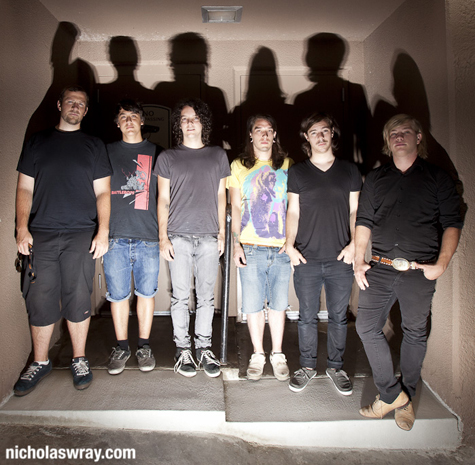
Nothing Like You’d Expect
A Lot Like Birds Readies The Release of Conversation Piece
It’s a quiet Tuesday night in Midtown and local progressive/post-hardcore band A Lot Like Birds has 80 or so fans packed into Luigi’s Fungarden as they tear through songs off their upcoming Doghouse Records full-length debut Conversation Piece, set for release on Oct. 11, 2011. Songs like “Think Dirty Out Loud” and “Sesame Street Is No Place for Me,” the album’s first two singles, have the crowd feverishly swaying back and forth to their spastic and energetic rhythms and riffs. Co-vocalists Cory Lockwood and Kurt Travis bounce around the small stage, shaking their long locks, taking turns singing and screaming, fully taking advantage of having co-vocalists (think call and response, harmonizing, layering, etc).
“I’m not the singer and he’s not the screamer,” Travis makes known as the two vocalists and I share a pitcher of Pabst Blue Ribbon at a local watering hole the Friday following the show. It quickly becomes apparent that this is an important point for them to get across. “We’re both vocalists,” he says. “I scream and I sing. And he screams and he sings. And we yell and we talk and we do spoken word. We do everything, we do all of it.”
Lockwood agrees and thinks of it like this, “I feel like a lot of times with dual vocalist bands that have a singer and a screamer, you’re diverging your fans and you’re going to have people that go, ‘Well I listen to the singing,’ and then you’ve got the guys who want tough music and they’re like, ‘Well I like the screaming.’ So if you bleed both of them, you’re forcing people to like it as a whole.”
Couple the outrageous and entertaining vocal work from Travis and Lockwood with the equally impressive instrumental work of the rest of the band, which consists of guitarists Michael Franzino and Ben Wiacek, bassist Michael Littlefield and drummer Joe Arrington, and you’ve got yourself one interesting record in Conversation Piece. One that crosses genres, tears down boundaries, leaves the listener wondering, “What’s next?” after each track comes to a dramatic close, and one that will most likely take a few listens to grow on you. They are aware of this.
“I know that music like this has to grow on people. People are really slow at picking stuff like this up,” says Travis.
“It’s almost easier for us to do weirder stuff,” Lockwood admits.
And weird it is, although we’re not talking about an un-listenable type of weird here; this isn’t just random noise after all. We’re talking about calculated time signature changes, non-traditional song structures, heavy-hitting breakdowns mixed with luscious reverb and delay-ridden clean parts, impressive and off-the-wall guitar riffs and interesting lyrical content to boot. Take the following lines from “Think Dirty Out Loud” for example, where Lockwood screams, “I spiked both our drinks with a gallon of ink / Now I’m writing a novel from your insides / We’re a spider with our limbs doing anything but walking / A conversation with our mouths doing anything but talking.” Or where Travis sings, “I eat emotional wrecks / And yours is the best.”
“I remember the instance in which we started writing the lyrics,” Travis says of the song. “I was totally enjoying myself, just laughing to myself, just thinking I’m the most clever fucking person ever.”
It is noteworthy to point out that in a number of ways, Conversation Piece is entirely different than A Lot Like Birds’ last offering, 2009’s Plan B. The latter was largely the work of guitarist and songwriting catalyst (as well as the band’s original vocalist) Michael Franzino, who invited a horde of local musicians to play everything from trumpet and trombone to cello and violin on the record. Plan B didn’t even feature a live drummer, as Franzino programmed the drums himself via computer. Conversation Piece is much more of a collaborative effort and consists of mostly the band’s core instruments (guitar, bass, drums, vocals), although it does contain some programmed stuff (“A Satire of a Satire of a Satire is Tiring”) and a little bit of horns (“Vanity’s Fair”) as to not depart completely from the band’s tendency to blend live instrumentation with orchestral and programmed elements. One of the most obvious differences between the two records is the solidified lineup, which includes the recent addition of Travis, who up until this summer had spent the last couple years co-fronting another Sacramento-based post-hardcore band, Dance Gavin Dance. “There’s four new members,” Lockwood says of the post-Plan B lineup. Travis interjects, “I’m not the new guy, you know what I mean? I’m the newest by all means. But Plan B was pretty much one or two guys, now this record is everybody giving their opinions and whatnot.”
For the recording of Conversation Piece, A Lot Like Birds turned to Portland, Ore.-based producer/engineer Kris Crummett, a familiar face to Travis, they have recorded two DGD albums together (2008’s self-titled record and 2009’s Happiness).
“As soon as I got kicked out of Dance Gavin Dance, Kris hit me up and was like, ‘Let me know what you’re doing, whatever you do, just let me know,’” Travis remembers. “It was kind of interesting because when I joined A Lot Like Birds, they were already talking about and thinking about going with Kris Crummett. I love that guy, we have a good history; we have a good thing going on.”
The band worked rigorously with Crummett for three weeks, focusing all of their creative energy on the record, which wasn’t even necessarily completely written yet, as Travis and Lockwood both had a fair share of lyrical work to do while in the studio.
“Everybody was hella trippin’, but that’s kind of how I like to work anyways,” Travis says of the high-pressure situation to complete basically half an album’s worth of lyrics on the fly. In the end, things worked out beautifully for the two vocalists, who found themselves locked in a room with Crummett for hours on end, pounding out vocal ideas together.
“I don’t think either of us had any idea how well we were going to work with each other,” Lockwood says of co-writing. “I’ve never worked with another vocalist before.” Travis pointed out that because the group was away from the everyday distractions that come with being home, they were able to channel everything they had into the record. “When you’re in your home town and you have all your stuff, you know, you have your job that you go to, you’ve got your girlfriend, you’ve got your parents and all this stuff. Sometimes it’s distracting,” Travis says. “I hella missed that when I was a full-time touring musician. You kind of just focus on music. So when I got to Portland, I was just kind of like, ‘Ah, I don’t have to think about anything other than just this record,’ and it got all of our attention.”
Even still, the band didn’t finish everything they needed to in their allotted time with Crummett, and they had to record one song in Sacramento with friend and sound engineer Chris Miller. Crummett was still producing even from hundreds of miles away, though, as the band Skyped him during the sessions with Miller.
“He was still there like being able to hear the takes,” Travis says with a chuckle at the thought of Crummett’s face on a computer screen in the room for hours on end.
“He was just like eating Chinese food and shit,” Lockwood says through a laugh while air shoveling a bite of imaginary food into his mouth.
After three weeks spent in Portland with Crummett and a couple more days’ worth of sessions with Miller in Sacramento, the record was finally done, or so Travis thought. “Knowing my luck, we do like two days with Chris and then we get everything done and we’re like, ‘Yes! Fuck yes, it’s done,’” Travis says. “And then I get a call from my guitar player and he’s like, ‘You’ve got to come back and do some more stuff,’ and I was just like, ‘Dude, when is this going to end? We’re not even in Portland anymore.’ But it was completely worth it and the song came out way better than I even thought it could.”
In between the Portland and Sacramento recording sessions, A Lot Like Birds even found time to embark on a week-and-a-half long West Coast tour. It proved a good opportunity to work out the brand new material in the live setting and to gauge people’s reactions to it as well. “It was really like a testing the waters sort of thing,” Travis says. “To see who gives a shit right from the get-go. It was a good response!”
Lockwood recalls one particular night in Anaheim when a girl came up to him at the merch table after the show and told him that she hadn’t heard music like theirs in years, since the early ‘00s. “That’s definitely when I started playing music, that’s when we both started getting really into it. So if anything, if we draw comparisons to stuff from back then, that’s all I’d love to hear.”
Unfortunately for A Lot Like Birds, references to the sounds of the early ‘00s aren’t the only comparisons they’re receiving, as a large number of people (mostly via the Internet) are saying they sound too much like Dance Gavin Dance. No doubt there will be comparisons: both bands are from Sacramento, both have two singers, both have ripping guitar players and rock-solid rhythm sections; heck, they even recorded with the same producer, so yeah, sonically speaking there are some similarities too. But what’s funniest to Travis and Lockwood about the whole situation is that these quick judgments are coming from the album’s two singles, because those are the only two songs off Conversation Piece that the general public has heard.
“People have been really quick to go, ‘Oh, this is what their whole album is going to sound like,’” Lockwood says.
“They don’t even know how versatile it is,” Travis contends. “You know how the Internet goes; people are very, very quick to judge. It’s funny, it’s almost tickling. They have no idea. It’s going to be cool, because they’ll realize it when it comes out.”
Travis also wanted to get off his chest how he feels for Lockwood, who seems to be receiving the brunt of the reviews. The problem? Apparently he screams too much like Jon Mess, DGD’s co-vocalist. “Dude, if you have ears, you would know that it’s completely different,” Travis demands. “Their screaming styles are completely different. It’s just kind of like Jon Mess is the only person they can reference. It’s so funny, like when people compare me to Jonny Craig [DGD’s original vocalist who replaced Travis when he re-joined the band this year], it’s like, ‘Are you fucking retarded? Do you actually have ears? Because I sound nothing like him.’ Not that I couldn’t sing Jonny’s stuff and not that Jonny couldn’t sing my stuff, it’s just, we don’t sound alike. It’s the same thing with Jon Mess and Cory, and I just feel for him.”
Travis has gotten his fair share of attention, too, ever since his departure with DGD. “It’s just something that you have to deal with,” Travis says of constantly being asked about his situation. “It’s like one of those things about your job that you hate but you have to do anyways. I kind of relate it to that, because no I’m not upset, no I’m not tired of it. It’s just one of those things that I know that I’m always going to have to address and that’s fine. If I didn’t have all of that then I wouldn’t have any of this amazing stuff that’s going on right now. So, I think of it that way. Not like, ‘Oh man, I don’t want to talk about the past.’ All of that shit needed to happen in order for this amazing stuff to happen. I look at it like that so I’m not upset when someone is like, ‘What was it like? You got kicked out! Blah blah.’ I’m like, ‘Yeah, I did, but things worked out.’” And if you’re wondering, everything is cool between all the members of DGD and A Lot Like Birds. So much so that the two bands will share the stage together on Thursday, Oct. 13, 2011 at Sacramento State’s University Union.
After weeks spent listening to an advanced copy of their new record, an hour spent over beers at a local pub and a killer live set witnessed, it’s apparent to Submerge that A Lot Like Birds are their own band with their own identity and their own sound. Conversation Piece is no doubt the record that will solidify that and as of right now, getting the album out and into the hands of people who care about it is the only thing on their minds. With a grin from ear to ear, Travis says, “I think things will pop off real fast once that happens.”
A Lot Like Birds’ Conversation Piece will be out on Oct. 11 via Doghouse Records. See them live at Sacramento State’s University Union Ballroom alongside Dance Gavin Dance on Oct. 13. Sacramento’s own Ten After Two will also perform. Tickets are available at the University Union Box Office.

Truly Inspired, Jack and White
Brooke White and Jack Matranga Write Free as Jack and White
On paper, it would seem that indie rocker Jack Matranga and American Idol alum Brooke White have very little in common musically. But good music isn’t made on paper. It’s made by people who share an undeniable connection. Though the two songwriters may have had different paths that brought them to this point, it’s apparent from listening to their debut EP as Jack and White, Gemini, that the duo may very well be meant to be.
While both describe their partnership as remarkably easy, getting together was a bit difficult. Matranga, a Sacramento native, was guitarist for Self Against City, which released Telling Secrets to Strangers in 2007 on the Rushmore imprint of Drive-Thru Records. Since then, he has worked as frontman for Tin Can Notes. White released an album in 2005 with co-writer/producer Tim Simms titled Songs from the Attic, but it wasn’t until she became a finalist on the seventh season of American Idol that she received national attention. While she didn’t win the competition (though showed well by landing in the top 5), her time on the program was spent wisely. She ended up starting a record label with Randy Jackson (June Baby) and released a second solo album in 2009, the aptly titled High Hopes and Heartbreak. She was set to work on a third solo album when she met Matranga and both their courses were altered.
White and Matranga were set up to write together by Brooke’s manager. But it took some effort to actually get the two songwriters in a room together. Matranga says they tried for “four or five months before we actually did it.” White remembers that the two had actually met prior to that at one of her gigs at the Hotel Café in Los Angeles, but Matranga may not have made the best of first impressions.
“Technically, we did meet at the Hotel Café, and Jack came to meet up with Brad [Fuhrman], who’s our manager, to go to a Paul McCartney concert,” White says. “So they came and left my show to go see Paul McCartney.”
Perhaps getting stood up for a Beatle is understandable. A year later, in February of this year, the two got together to write for White’s third solo album. However, by April, they’d decided to start writing as a band instead; thus Jack and White was born.
“We would set up these writing sessions, and I was writing to exhaust,” White explains. “I just was not in the mood to do any more co-writes. I was like, ‘I just can’t write any more today.’ I would call Brad and be like, ‘Can we reschedule with Jack? I’m really sorry.’ When we finally wrote, it was like, just… There you go. Here we are.”
“Yeah, that wasn’t so bad,” Matranga adds, laughing.
Though the two were set up on a sort of musical blind date, the sparks starting flying almost immediately. It took both of them by surprise.
“It’s not forced at all, and it’s kind of weird… I’ve never written with anyone before like that, like a writing session style, where you’re writing for someone else’s record,” says Matranga, who was comfortable working in the band dynamic prior to Jack and White. “This was a lot more focused, and I guess a lot more free-flowing, because we just naturally let lyrics, melodies and chord progressions come out. It was all a jumble of natural expression.”
“Free” and “natural” are words that could be used to describe Gemini, a six-song EP that was released on June Baby Aug. 23, 2011 and produced with indie film composer Danny Cocke. Each track has a smooth-as-silk, instantly hook-y sound. It’s not music you have to think about, just pop on and enjoy. In the following interview, White and Matranga talk about what it’s like finding musical serendipity and why they’ve decided not to overthink anything in regards to Jack and White. We spoke to the duo over the phone from Los Angeles on the day of Gemini’s release.
I think this is the first time I’ve ever spoke with a band on the day of their record release. How has your day been?
Brooke White: We’re writing a new song.
Jack Matranga: Yeah, we’re writing a new song right now.
BW: We don’t quit, James, we just keep rolling here. No rest for the weary.
Can you talk about what you’re working on right now?
JM: Yeah, it’s a new thing that we wrote while we were recording a little acoustic session. We just started working on it out of nowhere and got a few bars of it and decided that we needed to write it in the next couple of weeks. It just turned out that we were getting together today. Got together last week to work on it a little bit and decided to finish it up today, which is kind of random. We didn’t really plan on finishing it up the day we released the EP.
It seems like that’s how a lot of the band has come together. You didn’t really plan on it, but it ended up working out.
BW: No plan is the perfect plan.
Brooke, had you heard any of Jack’s music prior to this?
BW: No, nothing, never heard a darn thing. I knew that he was in Tin Can Notes, but that was all I knew. Brad had hardly given me any introduction. I’d remembered meeting him briefly at the Hotel Café, like vaguely. I totally remembered meeting him, but I couldn’t remember what he looked like…
Have you since gone back and listened to it at all?
JM: We’ve listened to so much of each other’s music that we’ve done in the past now after knowing each other, more than we ever would have had we never had met.
BW: I don’t think Jack would have ever naturally listened to my music, and I don’t think I would have ever found out about his music. It’s so funny, because I think that was one of the things for me when I was thinking about us writing, part of me in the back of my mind was thinking, “Really? Are we really going to be good to write together?” He’s this indie, pop rock kind of guy. I thought he was that hip, rock…not that I don’t think he’s like that anymore! I don’t know if I thought we were going to be a great musical match. Whatever it is that we are together, works very nicely. I was saying to Jack that a lot of my previous writing sessions, I write with songwriters–quote, unquote–people who are doing this every day for a living.
JM: Clock in, clock out kind of guys.
BW: Not that I’m saying Jack doesn’t do the same thing, but older, established writers. I hadn’t written with someone so close to my age with such a youthful, fresh energy… Now that makes some of my other writers sound like…I’m not trying to hack on anyone! I just think we’re on the same wavelength of energy.
I would imagine, and correct me if I’m wrong, a lot of the people you’re used to working with don’t just work with you, but they also work with…
BW: Yeah, a lot of writers. It was just completely different, and maybe because Jack hadn’t worked in this kind of environment is what made it so fresh.
Did that take a bit of adapting on both of your parts? Since Jack was used to working in the band dynamic, and Brooke was used to working with more established songwriters?
JM: It was very easy.
BW: No adapting. If anything, it was adapting to something that was easier than anything I’d ever done before.
JM: It was just not overthinking and allowing it to be such.
Listening to the EP, it sounds like you’ve been working together for a long time, but you really haven’t.
JM: That is one of the most magical parts of the entire thing.
BW: That’s something you can’t make happen. You can’t force it. It’s just lucky. You luck out when you find something. That being said, it’s not like Jack and I just started this. On our own, we’ve been developing, growing, trying, beating our heads up against the wall in a variety of ways to finally get to a place where it’s like, “Woah, there you go.”
JM: This is how it’s supposed to be…
Brooke, you were supposed to be working on a third solo album. Are you still working on that solo album?
BW: No. Not right now. I’m not saying that I won’t in the future, but my whole focus has shifted because, like I said, I’m taking it as it comes. This is a gift to me. It’s a gift, it’s rare, and I want to continue with the thing that feels the most natural and has the most inspiration and energy around it. That’s when I feel you really create art. There’s the craft part of it, the work part that we all have to do, and I definitely do that. I’ve worked at it. But when you hit inspiration, it’s definitely better than something that you could have worked a million hours on. Just because you’ve worked super hard on it, doesn’t make it the best. I think the inspired stuff, at the end of the day, usually takes the cake. I’m not saying that I’m not going to do that [a new solo album], but I’m just so intrigued by [Jack and White], I’m very fulfilled by it, so that’s where I’m going with it.
I saw the acoustic video for “Telephone Games.” I think Brooke says right before you start playing, “I’m thinking about it too much,” and then you recount and start all over. Has that become a mantra for you guys, or is there a certain head space you have to get into where you just kind of clear your mind?
BW: It’s weird. You have to get there without trying to get there.
JM: The performing of it is a completely different ball game than getting in the mindset of writing. Everyone has their own thing for getting in the mindset to perform, and I think that’s what was being referred to in that video. Mostly with the project and the writing, we’ve fully embraced the freeform spirit, don’t worry too hard, don’t over think. That has probably been said at every one of our writing sessions.
BW: And not just in the writing. We didn’t have an A&R guy standing over our shoulders… We had a plan. It’s amazing we’ve been able to come out of this in a timely manner with a such a great finished product and also enjoyed it and went at a pace where it wasn’t stressful. We pulled a few late-nighters, but the whole thing never felt pressured. There was no pressure. It was just an experiment that worked out really well.
You didn’t go into this with any expectations, but now that the EP is released, do you have any expectations for the project?
JM: I have one. It includes playing the music live in front of people. As a fan of music, when one of my favorite artists puts out a record, I expect to see them live playing those songs somewhere near me. For all the people who have now heard the record, I’d imagine that if they enjoyed it, they’d want the same thing, and we should deliver. As far as anything beyond that, I don’t think it’s good to have expectations.
BW: I have a hope that we get to make more music. I want us to make a record. That’s the only other thing that I can see that happening.
Do you see anything standing in the way of that?
JM: You can’t tell what can come up. You can’t tell the future… We’ll definitely not put anything in the way of that happening if that’s the question.
BW: The strategy of taking it as it comes is working so well right now, we really don’t want to mess with that.
See Jack and White live at Luigi’s Fungarden on Sept. 17. The show starts at 8 p.m. and has a $7 cover. Also performing will be Shannon Curtis and Sherman Baker. The Gemini EP is now available through iTunes, and the band was even featured as the online music retailer’s Single of the Week.

Double Dose
Ganglians release a new double LP, Still Living
Forget rolling joints or slamming pills. Pop on a pair of headphones, shut your eyes and listen a while, and within minutes you are high as a kite. Meth huff? Easy. Coke snoot? No problem, just queue the track on your laptop. Wouldn’t it be nice if a high was as easy as paying 99 cents for an audio delivery of pure ecstasy?
In fact, the audio drug fad has recently caught media attention as parents debate whether or not “i-dosing” is in fact getting their children high. Communities in the Midwest have been particularly stressed about it, Ryan Grubbs, frontman of Sacramento’s psychedelic acid pop act Ganglians mentioned in a recent conversation with Submerge.
There was a sense of amusement in the way he described how genuinely terrified parents are by the thought their children might get hooked on ear-fed drugs. While the notion is laughable, the Montana native weighed in heavily on the effect music can have on the body, especially when it is delivered through headphones.
“We’re all guilty of listening to music on laptops and stuff,” he said.
But there is no musical experience that quite compares to an array of sounds streaming into each ear through a set of headphones, he added, creating a sort of vortex that almost feels paralyzing.
“There’s something about headphones [where] you can’t ignore the music, everything around you becomes part of the music rather than just being in the background.”
Rest assured, Ganglians are not looking to convert their listeners into junkies. Creating a setting, sometimes hallucinogenic or based on psychedelic experiences, however, plays a part in how the four band members (Grubbs, guitarist Kyle Hoover, drummer Alex Sowles and bassist Adrian Comenzind) write their songs.
Stereophonics, the encompassing delivery of sounds to each eardrum, is something that the four-piece has toyed with since the release of both their self-titled debut EP and full-length Monster Head Room in 2009.
Still Living, Ganglians’ next anticipated album via record labels Lefse and Souterrain Transmissions (in Europe), is no different.
The band released its first single, “Jungle,” in April 2011, accompanied by a tripped-out music video saturated with colors and Play-doh like prosthetics (which debuted in May), and quickly stirred an online buzz amongst music blogs and sites like Pitchfork and Fader. It was followed by the release of another single, “Sleep,” in July, made available for free download online.
The double LP comes out Aug. 23, 2011, giving Ganglians-lovers the chance to experience Still Living in its entirety. While Monster Head Room feels a bit more tribal and raw, Still Living is a dose of shimmering exultation, something like a joy ride. From the opening notes of “Drop the Act,” an anthemic call to arms to today’s apathetic youth, the album will keep listeners guessing from start to finish. Like Monster Head Room, it is peppered with subtle surprises–sounds of rain, panting, sirens, bats–staying true to the band’s ear-teasing tendencies. At the same time, Ganglians provides an album that’s more complex than its predecessors, venturing into R&B territory with “Things to Know,” a minimal composition of rumbling bass and Grubbs on vocals, and exploring heavier composition with the six-plus minute ballad “Bradley.”
Meanwhile, the band is preparing for their August tour, which starts along the West Coast on Aug. 10. Grubbs has been living in San Francisco, and with his return to Sacramento there is little time to waste being five months out of practice.
Still, this band is young, and jobs and living situations get in the way. Touring and putting out records was not something the band had expected during their early beginnings in the attic of a Sacramento house three-and-a-half years ago.
The fact that they have come this far by their mid-20s has been a surprise, or a “happy accident,” as Hoover put it.
Submerge spent an afternoon with three of the young four at Luigi’s Fungarden. Discussing the upcoming album, lo-fi and slacker-ism over beer, Sowles sat quietly while Grubbs and Kyle did most of the talking. The following is an excerpt from our conversation.
When I listened to Still Living I was feeling really elated. Do you have the same feeling when you’re playing your songs?
Ryan Grubbs: When we’re recording, there are moments of euphoria, and not necessarily dread, but uneasiness, uneasiness juxtaposed with euphoria. Yin and yang kind of stuff. Not trying to be too blissed out and not trying to be too depressed. It’s an album. You want people to experience a range of emotions.
Were any of the songs reflective of Sacramento living?
RG: Of course. And of people, and just day-to-day life. Struggles. First and foremost you’re trying to please yourself and experience yourself. And secondly you want to give your friends something. And then after that is the wide spectrum. You want everyone all and all, to find something there. You know, “Jungle”–it’s like the city of trees, it almost feels like a jungle but it’s kind of urban. “Sleep” is kind of about trying to escape day-to-day life by just sleeping, but then you have that voice in the back of your head that just throttles you out of it, like, “Hey, you got to make something. You can’t just like sit on the porch all day doing nothing.” They’re definitely reflective of the life living in Sacramento, for sure. I think that the whole ambiance of the album is very busy.
Alright, you can laugh at this question, but do you feel like your music represents your generation at all?
Kyle Hoover: In the sense of slacker-ism? There is a sense of underachievement, a little bit, every once in a while.
RG: Definitely. We are not trained musicians at all. We are not studio musicians. We just kind of picked up the instruments and tried to create what’s in our heads. But as far as this is music created for us, and for our friends, definitely. I mean that’s part of the reason I put “Drop the Act” in the beginning, because it’s kind of a half-hearted call to arms. Because I think I wrote the lyrics for that song after reading an article about the “twenty-somethings,” and I had never even thought about that point, but I thought, “Wow, they’re just choosing to drop out in bigger numbers than ever.” They just don’t want to be part of the system. They’re kind of just fed up with all the politics. They don’t want to participate at all. And that’s kind of what “Drop the Act,” the first song on the album, is just about not wanting to participate in that. And I think that a lot of people in our generation feel the same way.
When you guys are writing songs, how often are psychedelics part of your writing process?
RG: Never. Well just weed. The part that it is a process is in…
KH: Conceptualizing. Experiencing it and drawing from that experience and putting it in a song. But none of us ever get high and write music.
RG: Yeah, I tried it. “This is so amazing!” And then the next day, I was like, “What the fuck? Am I scratching a needle across the table?” But at the time it’s all-absorbing. There’s nothing else in the world that matters.
KH: I feel like as far as psychedelics influence goes in our music, it’s more constructing that feeling from your experience on psychedelics.
In a recent interview you expressed a desire to move away from the lo-fi garage scene and hope that Still Living accomplished that. Are you hoping to appeal to a different crowd?
KH: I don’t think we were ever trying to appeal to the lo-fi crowd in general. We never intended to be lo-fi. That’s why I get so mad when I read about that stuff in music journalism in general, because I feel like all these bands that we’re lumped in with and we sort of know, no one goes out of their way to make a bad-sounding record.
RG: I don’t know, there’s something that’s very rewarding about that kind of recording and I understand why I like lo-fi and why other people like lo-fi. There’s something about lo-fi, it’s just the perfect encapsulation of that moment you can’t tweak with. Whatever you have around you at the time, that’s what you’re going to do with it.
KH: But I think Monster Head Room was definitely intended to be a hi-fi record, it just wasn’t there. And then this was like, oh shit, we got the money and the studio to do it, let’s make a fucking clean record. A pop record. A meaningful pop record.
Still Living will be released through Lefse Records on Aug. 23. Go to Lefserecords.com for ordering information. You can check out Ganglians live at Luigi’s Fungarden on Aug. 10.
Don’t miss your chance to see The Golden Ghosts
The Golden Ghosts are a buzzing new Los Angeles-based duo consisting of Riley Bray on guitar and vocals and Justin Goings, who has strong Sacramento music scene ties having played in bands like Mister Metaphor and Jeepster. Their music is groovy and really quite infectious; and with them touring through the area soon you’ll have quite a few chances to check them out live. On April 25 they’re playing at Luigi’s Fungarden, April 26 they’ll be in Nevada City at Café Mekka, April 27 they are at Luke’s Lounge in Dixon and on April 28 they will be at Plainfield Station in Woodland. Also, you can catch them on May 20 alongside Agent Ribbons and Roman Funerals at Cesar Chavez Park in downtown Sacramento as part of the annual Friday Night Concerts in the Park series.
-J. Carabba

Prieta are hard at work on a new album!
Sacramento rock favorites Prieta are hard at work on a new album, much to the delight of everyone at Submerge. They’re approaching this one differently than their previous efforts in that their current practice space is actually Ira Skinner’s Alley Avenue Recording Studios, so as the band finishes new material they will be recording it, mastering it and releasing it a couple tracks at a time. The first two songs completed were “The Company You Keep,” and “Lifted Away,” which were both mastered by Joe Johnston at Pus Cavern Studios and released this past Saturday at the band’s gig at Luigi’s Fungarden. “It is in a lot of ways kind of a different direction for us,” guitarist Mat Woods recently shared with Submerge. “We’ve just been writing tons of new material and incorporating more keys and laptops and electronic elements and whatnot.” To keep up with the band and to find out about their upcoming gigs, like them on Facebook
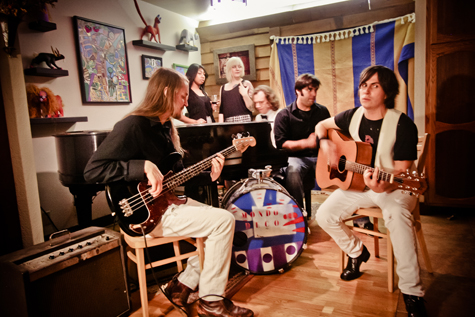
Bless This Mess
Lite Brite, Mondo Deco, The Babs Johnson Gang
Friday, Feb. 11, 2011 – Luigi’s Fungarden – Sacramento
Thirty minutes into watching a live band, the singer tells you, an audience member, to waddle. If you’ve ever seen local duo The Babs Johnson Gang play, you’re already prepared to start shaking your ass, because if you’re the best waddler during the “Waddle” song, you are finely rewarded. This time, the band offered up a tiny trophy, which was immediately swiped by a middle-aged woman who stepped onto the stage and started swinging her hips.
The Babs Johnson Gang opened Friday night’s show at Luigi’s Fungarden with Mondo Deco and Lite Brite, a local lineup that brought a night of ass-shaking rock ‘n’ roll to the cramped all-ages music venue.
The Babs duo play music that is both grungy and honky-tonk, rock ‘n’ roll and punk at the same time, using little more than distorted guitar coupled with crashing drums. Ten or so people were standing in front of the stage at the start of their first song. The two band members exchanged messy vocals that began in rants and would crescendo into shrieking howls over the drums and guitar, and then abruptly alternate into psychedelic, reverb-rich melody. Drummer Cory Gorey piped viciously into his harmonica between singing and drumming. More people filed in to watch. Smashing away intensely at the drums, Gorey tipped over his tom and later shoulder-bumped his mic into an obnoxious swivel around his head. Unaffected, he kicked the tom away and the two carried on, rarely pausing between songs. Midway through, guitarist Tim Pronovost stepped into the crowd, beating one of Gorey’s toms and handing it off to an audience member to play before returning to the stage. By the time they started playing “Waddle,” the crowd reached to the back of the room.
The Babs Johnson Gang was followed by Mondo Deco, one of Sacramento’s newer rock acts. The six-piece band stepped on stage looking like they walked out of a ‘60s film, sporting black and white pants, button-down shirts, suit jackets and bowties. In addition to two guitarists, a bassist and a drummer, the band featured two shimmying back-up singers/dancers in sparkling attire and boots. Singer/guitarist Jeremy Green, who also fronts local band Goodness Gracious Me, has the voice of a quintessential rock vocalist, hitting shrill, high-pitched screams and low notes, too. Guitarist Kolton James’ fingers glided along the neck of his guitar, delivering smooth solos and progressions with ease. Green counted in the last song, “Mouth Without a Muzzle.” At this point the crowd was thick and the room was hot. The band delivered one more dose of heavy guitars joined with a danceable beat, riling up the crowd to clap and sing along. Then the drums and bass slowed, the dancers slowed to a sway, and the crowd sang with Green until the song came to a harmonious halt.
Enter Lite Brite. Frontman Eddie Underwood kicked off the set with a power-driven guitar riff, summoning the start of the three-piece band’s hit “Big City.” Underwood’s gritty, reverb-filled screams matched with surging guitar distortion and grinding bass conjured up an amphitheater-style performance. The Led Zeppelin influence is apparent. Underwood leapt in the air, shredded his guitar and thrashed about his mane of curls simultaneously, pausing ever so often to thrust his guitar high above his head. Sweat dripping from his chin, he turned to jam his quivering guitar up against the face of his amp, delivering pulsing feedback throughout the room. Heads were rolling in the front row by the time they played their final song, “Space Shuttle.” The guitars shot off like sirens and the massive drums rolled in. By the end of the song, Underwood was on his knees face-down on the stage, moaning into the drum mic cupped in his hands.
At the end of the show, Submerge asked Babs Johnson Gang for their set list. Gorey answered, “We never use set lists. Stick that in your Submerge.”
Then he offered us a free CD.
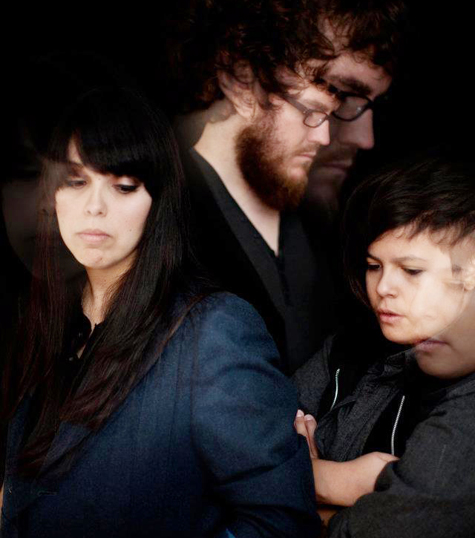
Picture Perfect
Sister Crayon Steps It Up Further on Debut LP
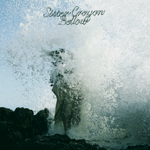 It was a gray and windy afternoon on the beaches of Malibu. A tidal wave warning was in effect, but there local band Sister Crayon stood, fully-clothed, sharp shoreline rock at their ankles, as photographer Eliot Lee Hazel barked orders to capture the frozen chaos of crashing white caps for the band’s debut album art.
It was a gray and windy afternoon on the beaches of Malibu. A tidal wave warning was in effect, but there local band Sister Crayon stood, fully-clothed, sharp shoreline rock at their ankles, as photographer Eliot Lee Hazel barked orders to capture the frozen chaos of crashing white caps for the band’s debut album art.
Lead singer Terra Lopez slipped during one shot, cutting her leg, but Hazel ran his shoot like a drill sergeant. “He just said, ‘Get up. Don’t smile. Don’t look at me,’” Lopez said. “Well, he’s a sweetheart, nice guy, you can sit down and talk to him, but when he’s taking photos he is so intense.”
As absurd as it feels to the members of Sister Crayon, Lopez and drummer Nicholas Suhr spoke of the shoot as one of their most memorable music experiences–even though it had little to do with music. Along with Hazel’s artwork, the band has a high-def music video done by celebrity photographer Robert Ascroft. Browsing both photographers’ websites, perusing the tastefully gratuitous images of Devendra Banhart, Usher, Mariah Carey, Edward Sharpe and Brad Pitt, Sister Crayon will be the first to tell you how privileged, yet out of place they feel. Are these the last remaining minor moments of Sister Crayon before they receive Coachella bookings and Japan tour offers?
In the next few weeks, the band is playing humbler venues like Townhouse for the Sacramento Electronic Music Festival and Luigi’s Fungarden for the Bellow album release party. So our indie darlings have yet to grow too big for our sleepy city. Lopez looks like a siren Viking vixen in the video for “(In) Reverse,” but when I met with her and Suhr at Mondo Bizarro (formerly Butch & Nellie’s) for an interview, she was back in her Midtown garb, a second-hand green army jacket and jeans–the Lindsay Weir of Freaks and Geeks look. She’s still the same shy songwriter, fronting a gloomy pop act that seeks inspiration in the lonesome despair of poets like Jean Genet and Fernando Pessoa.
The Bellow sessions scattered across the span of a year and a half. The newly realized lineup of Sister Crayon crammed in 18-hour shifts at The Hangar with engineer Scott McShane, who described the process as “tense” and a “guerilla recording style.” McShane produced the first Sister Crayon EP, Enter Into Holy (Or)ders, and the band never entertained the thought of working with anyone else. “Recording already is a really intimate thing. We bond so well with him. He gets what we’re trying to do, even before we understand it,” Lopez said.
“He’s able to throw out ideas that’s not in an insulting way. It’s just full-on experimenting and you know that it’s for the best. He pushes us to succeed,” Suhr added.
The tension came from the hourglass pressure of paying for studio time and the unfamiliarity of having a new drummer join two weeks prior, writing his parts on the fly. Suhr was not a complete stranger, knowing Lopez from her stint in The Evening Episode, but he and Lopez talked of the anxieties surrounding a debut full length. “We were zombies. We’d spend 18 hours in the studio and you can hear it in the record,” she said.
Originally, Bellows was intended to be a five-song EP, written by Lopez and synth-keyboardist Dani Fernandez, with “I’m Still the Same Person” being the only pre-released song to make the album. But once the band wrapped recording those five songs, creativity was running high and five more songs were written collectively. “Scott kept telling us there was a lot of tension on the record,” Suhr said. “If you know what was going on at the time it makes sense. There was a lot of time spent coming to an agreement on things, but whenever we’re writing together there’s no awkwardness. It was easy to go into the next five songs with an open mindset.”
Indeed, the settling in is brazen and culminates with a spacious piano ballad called “Ixchel, The Lady Rainbow,” in which Lopez’s visceral croon soars over a piece written by former member Genaro Ulloa. “Ixchel” was the last song the band recorded, a one-take recording done well past the midnight hour. “We did it live tracking,” Lopez said. “He was in the other room and I was in the main room singing. We could see each other through a little window, but that was it. It was the first take and it was incredible. I know it sounds corny, but there were tears in everyone’s eyes. We were all exhausted. Even Scott had tears in his eyes.”
Suhr added, “It’s one of those songs. Every other song on the record we did multiple takes because we felt we could do better. At the end of that song, everyone was just like what the fuck. It’s one of those songs where if it didn’t sound like that, with the imperfections left in, it wouldn’t have worked.”
The gloomy pop instrumentation informed by the troubled words of dead poets is an appropriate setting for an album titled Bellow, but Suhr said a lot of the mood is owed to McShane’s guidance. “I heard the five songs written before I joined, but the mood had changed through Scott’s ears.” Lopez said his touch is most prevalent on “Here We Never Die and “(In) Reverse” as he took the band’s ideas and focused them into a cohesive sound.
In addition to McShane, the Sister Crayon sound, most notably the lyrics, is in homage to the writings of Fernando Pessoa, a 20th Century poet and literary critic. Lopez only admitted her obsession with Pessoa’s work. She has a Pessoa tattoo and her Pug’s name is Ophelia, after Pessoa’s secret crush to whom he never confessed his love. “It’s the despair,” she said. “It sounds dramatic, but he was such a lonely individual. He was very mysterious and obviously people are drawn to that.
“I think that is a huge part of Bellow. ‘Here We Never Die’ is my talking to a lover in that way. The despair and sadness that he wrote is so sad that I can’t even finish one of his books. I have to read a sentence a day sometimes because it’s so much. It just floors me. I have no option when it comes to his presence in my music.”
As intense as Sister Crayon is sonically and visually portrayed, Hazel’s insistency that the band stop smiling as the chilly Pacific waves capsized on their heads speaks of the band’s unbridled joy in its work. As arresting as “Ixchel, The Lady Rainbow” is, Bellow closes with “Souls of Gold,” a cheery campfire sing-a-long with a blasting brass section and woozy synths. “We’re always such a serious band and a lot of our songs are really dark,” Lopez said. “I do like that the album ends on a lighter note than what it could have been.”
See Sister Crayon live at their release party for their new album Bellows at Luigi’s Fungarden on Feb. 19.


